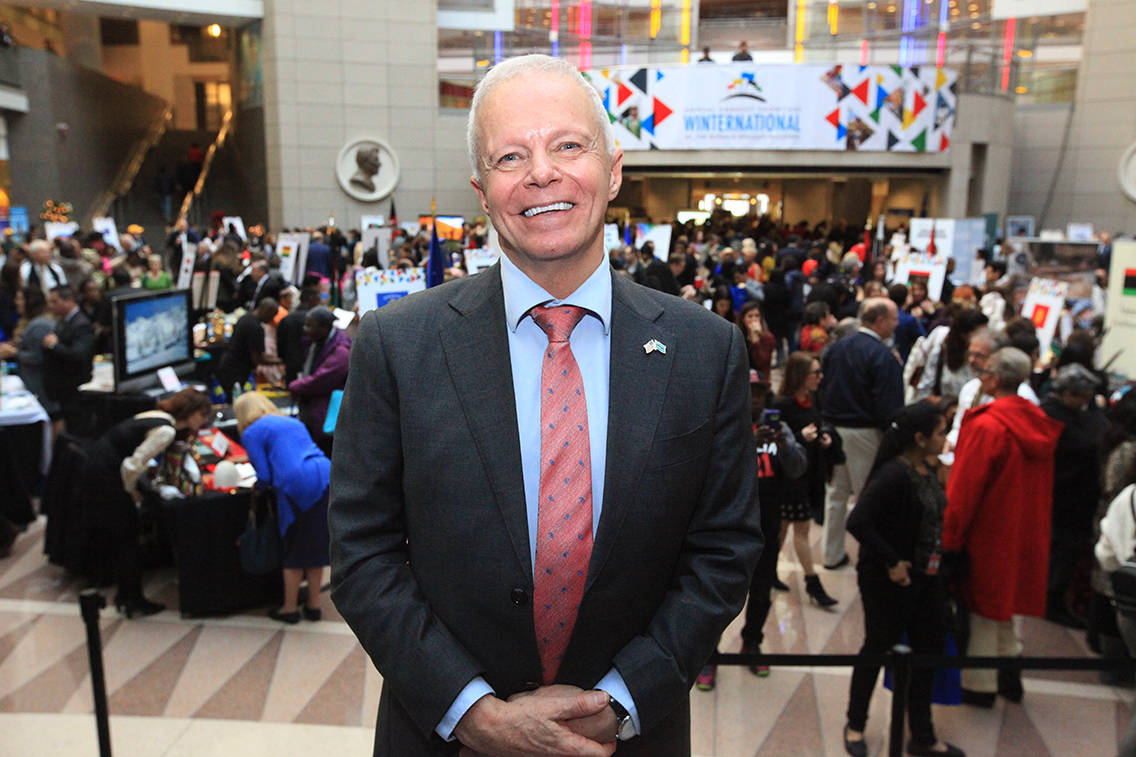
His Excellency David John Newman has served as the Ambassador of Botswana to the U.S. since August 2015. For 10 years prior to his appointment, Ambassador Newman served as Judge of the High Court of Botswana, and sat from time to time as Judge of the Botswana Court of Appeal. Prior to devoting himself to public service in 2004, Ambassador Newman worked for twenty years in Botswana as an attorney, conveyancer and notary public, and for fourteen of those years was managing partner in the legal firm of Collins Newman & Co.
As a member of the African Union, the Embassy of Botswana will be participating in Africa Day celebrations, including the Gala Dinner to be held at the Reagan Building on May 25. We take a look back at our 2016 interview with H.E. David John Newman.
Q: This year (2016) marks the 50th anniversary of Botswana’s independence (BOT 50). What is the significance of this milestone for the people of Botswana and how is the anniversary being celebrated in Botswana?
At independence, in 1966, Botswana was one of the world’s poorest nations, and, in the view of one political commentator was destined to be “an international charity case forever”. Happily, that writer was no Nostradamus, as, due to a combination of good fortune, good choices, and good governance, Botswana has progressed to its current status, as an upper-middle income economy and a beacon of liberal democracy, peace, stability and social justice. Although the people of Botswana (Batswana) are humble and unassuming by nature, they do indeed have much to be proud of, and are set to enjoy their Golden Jubilee with three days of celebrations throughout the country.
Q: As part of BOT50 what cultural initiatives are being showcased by your Embassy in the United States?
To kick-start this year’s celebrations, the Embassy opened its doors to the general public on May 7th, as part of the Cultural Tourism DC initiative. Although the Embassy had participated in previous years, 2016 witnessed a record number of Americans – over 7,000 – visiting the Embassy, and experiencing the sights, sounds, tastes and culture of Botswana. As well as hosting a high-level BOT50 Gala Banquet evening in June, the Embassy is planning a number of events during the coming months to showcase the country’s rich history, abundant natural resources, tourist destinations, conservation initiatives, culture and creative arts.
Q: Since its independence, Botswana has maintained a stable government making it attractive for trade and foreign direct investment — in fact Botswana has one of the world’s fastest growing economies. Tell us about the current economic climate in your country.
Botswana has a mature, multi-party democracy, free and fair elections having been held every five years since independence. Throughout, it has been a model of stability in the southern African region, and supported by an independent judiciary, and government that has constantly upheld the tenets of the constitution and adhered to the Rule of Law, Botswana has consistently been one of the fastest growing economies in the world. More recently, economic diversification has been declared a priority focus area, to reduce the country’s dependency on diamonds, and to create greater employment opportunities and economic growth. In collaboration with government and commercial stakeholders from Botswana, the Embassy recently participated in three inward investment symposia, held in the great cities of New York, San Francisco and Chicago, and similar initiatives of this kind are being planned in the months ahead.
Situated at the heart of the Southern African Development Community (SADC) consumer market, and boasting political and labor market stability, high literacy rates, no foreign exchange controls, a low tax environment, and zero tolerance
to corruption, Botswana is rightly recognized as one of the top investment destinations on the continent.
Q: Last year a 1,111 carat diamond was uncovered in the Karowe mine of Botswana, making it the world’s second largest gem-quality diamond ever discovered. What impact has the discovery of diamonds had on your country?
It is important to understand that, since their initial discovery, all Botswana diamonds have been ethically sourced, meaning that particular care has been taken to ensure that all mines adopt responsible business and labor practices, and protect the natural world by minimizing their environmental footprint. However, that is only part of the story, and alone would not have led to Botswana’s success story without strong political institutions and prudent economic policies to promote sustainable resource-led growth and development for the country and all of its people.
Q: The Botswana Consumer Trade Show is coming in August at Gaborone. The trade show, fair and exhibition attracts over 60,000 visitors. Could you tell us more about this event?
Botswana Consumer Fair is scheduled to run from 22-28 August, under the theme Shop, Discover, Explore. The objective of the Fair is to create an interactive face-to-face platform between exhibitors and consumers. This format allows exhibitors to promote their products and to demonstrate product functionality and benefits in a personalized setting, unlike other forms of marketing and advertising. In addition to the Fair, Global Expo Botswana will be a four-day event, from 23-26 November, held at the Botswana Conference & Exhibition Center at Gaborone, and intended to showcase a wide range of products.
Q: Botswana has a remarkable conservation record. The Okavango Delta is on the UNESCO World Heritage List and
the Chobe National Park has the largest concentration of wildlife in all of Africa. What measures does your government take to preserve these habitats?
Botswana is arguably the leading country in the world for eco-tourism, with high value, low impact tourism contributing to diversification of the economy away from reliance on diamond revenues. Having applied the philosophy that humans are part of nature, not apart from nature, government policies over the years have resulted in over 40% of Botswana being dedicated to National Parks or Wildlife Management Areas. This has created the “space” necessary for human-wildlife coexistence, and specific government initiatives have assisted communities in the wildlife range to transition from consumptive to non-consumptive tourism. Coupled with political will, there is a strong message of zero tolerance for poaching in Botswana, which has operated a hunting ban on all wildlife since 2014. It is evident that conservation works in Botswana, but this is no time for complacency. Botswana faces a wildlife refugee crisis, as more elephants and other iconic species flock to safe areas in the country from neighboring regions, and, as night follows day, so will that safe haven be under threat from those with evil motives.


